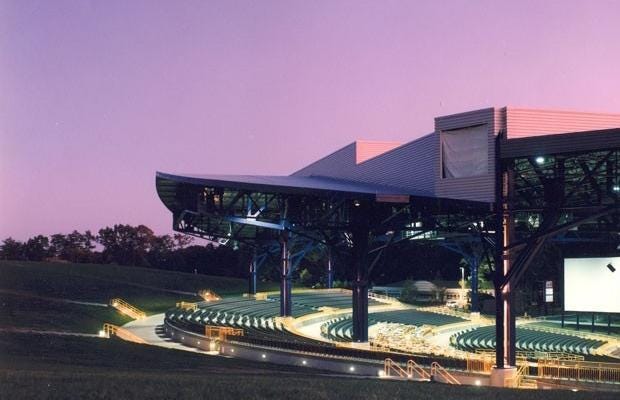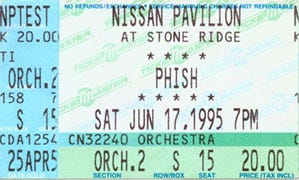
The fifth Phish show in five nights and five states brings yet another 20-minute jam, though it only qualifies if you count a rather unexpected interruption. Tonight’s Tweezer shows early signs of attempting to match its 50-minute predecessor, but at the 7-minute mark it gets diverted into a brand-new cover, if a well-worn one: Chuck Berry’s eternal “Johnny B. Goode.” The segue wasn’t an accident — the band had soundchecked the song earlier in the night at this DC-area venue now known as, sigh, Jiffy Lube Live. And JBG would go on to be a pretty sticky cover in the catalog, earning 23 total plays between 1995 and 1998.
A month and a day ago, Phish filled out their Voters for Choice benefit set with an intriguing group of new covers that only true record geeks would appreciate. Putting aside the Steinem tribute of Them’s “Gloria,” the band unveiled an obscure gospel cut, a Brian Eno album track, and practically the last Velvet Underground song even a dedicated VU tribute act would choose to play. All of these songs rapidly, if not immediately, disappeared from the repertoire. Meanwhile, Johnny B. Goode, staple of wedding and bar bands the world over, possibly one of the most ubiquitous rock songs of all time, the song Marvin called his cousin Chuck about, settled right in as a semi-frequent drop.
Phish, of course, has been both a wedding and a bar band, so it’s almost surprising that it took them twelve years into their career to dust off JBG. In fact, at least one member had played it before — Kevin Shapiro’s notes for the show mention that it had been a staple of the Tombstone Blues Band, Mike’s pre-Phish high-school group. But why unearth Chuck Berry’s autobiographical fable of stardom, a song so remedial it had been covered by everyone from The Beatles, Beach Boys and Elvis to Hendrix, Peter Tosh, and, yup, the Grateful Dead? And why do it now, in the middle of a tour when the band was skewing weirder than ever?
Really, a slice of classic 50’s rock and roll would sound strange in any era of Phish. For FM-addicted children of the 70s, the Fifties would likely be seen as the height of corniness. The only other frequently played tunes of that vintage in their songbook are Bill Monroe’s Uncle Pen and Clifton Chenier’s My Soul, songs that fit within the band’s semi-regular bluegrass and blues slots. Three-chord rhythm and blues is not their strong suit, and the only personal accent they put on JBG is to play it extremely fast, barely over 150 seconds on this night, 8 seconds quicker than Berry’s original single. Trey also mostly ignores the signature riff (which Berry himself nicked from Louis Jordan’s "Ain't That Just Like a Woman") in favor of just playing a delirious fountain of notes, as per usual.
The song sounds especially odd in the middle of another experimental Tweezer, though it ends up working in its favor — somehow, the torrid oldies recital clears the decks for Tweezer to get even crazier than it got in Mud Island. Three minutes after the Berry fades out, Phish is teasing Montana, an excerpt from a Tweezer of last year on a live album that hasn’t come out yet, and playing a deep ambient sequence that would fit right into The Siket Disc. After the intensity returns, the band stumbles back upon the Tweezer riff and calls it quits a full half-hour earlier than the last time around, a more concentrated statement than the prolonged improvs of the past week.
So maybe on this first night, Johnny B. Goode’s job was merely a proto-punk guardrail to keep the band from spiraling off into the sometimes self-indulgent headiness they’d explored at length in Memphis, Atlanta, and Raleigh. But the fact that it stuck around says something else entirely about where Phish saw themselves at this stage of their career. Playing one of the most famous rock songs ever, without taking the piss out of it a la acapella Freebird, is an arrogant move. It’s similar to the summer’s other lasting cover debut, the Beatles’ iconic “A Day in the Life,” another cheeky choice given that they had recently learned an entire double album of Fab Four songs and still decided to go for one more, and no less than one of their signature songs.

The obvious logic behind both of these songs turning up in 1995 is that they sound great in a big room with a big crowd, and they’re two songs where you can reasonably assume almost everyone there knows the words. While Phish was still figuring out how to adapt their own music for this environment, it makes perfect sense that they’d shop the shelves of the classic rock canon. But playing Johnny B. Goode, of all songs, is also a bold, swaggering strut, an attempt to write themselves into the central lineage of rock history with tongue only barely in cheek. The Dead played Chuck Berry covers as a reassurance when the music got too deep or too sad; Phish plays JBG as a victory lap
The song would go on to show up in some of their most iconic performances: as the encore for NYE at Madison Square Garden at the end of this year, at the first post-Remain in Light show in ‘96, and in the middle of the second set of the famed Denver Ghost show in ‘97. They also played it a bunch in Europe, rightly celebrating Chuck Berry’s music as one of the greatest American exports. It disappeared just as the endless, escalating party of the Phish scene started to darken, when the song’s fairy-tale optimism made it expendable. It’s a song about a rock star’s rise from obscurity to fame, not the debauchery he finds there.
[Ticket stub from the Golgi Project.]


